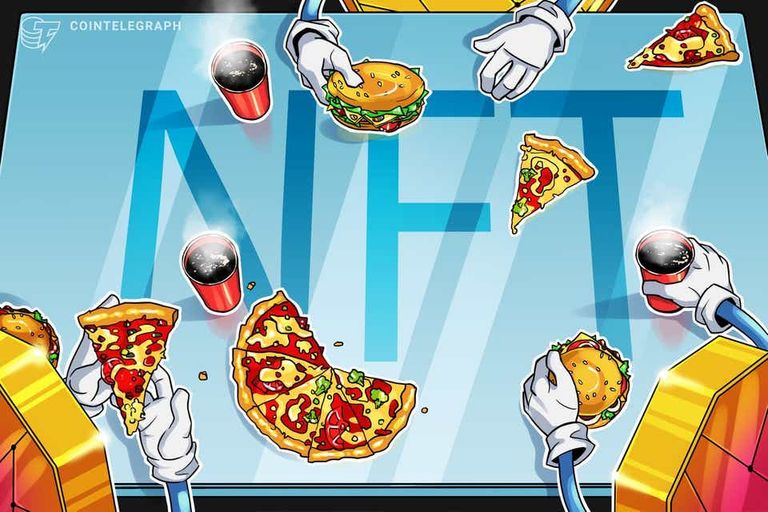Fast-food restaurants across the globe are jumping on the NFT bandwagon with their own digital tokens.

The past few months have seen an explosive uptake of nonfungible tokens (NFT) as crypto artists, gaming enthusiasts, musicians, celebrities and now fast food chains deploy the technology in various ways.
Fast food giants such as McDonald’s, Burger King and Taco Bell are taking to NFTs because of their capacity to enable gamified promotions and distribution of their products and services.
Here is a quick look at emerging NFT adoption in the fast-food sector.
Taco Bell
Taco Bell is a popular fast food brand in the United States thanks to its Mexican-style products. In a March 2021 marketing campaign, Taco Bell launched a new NFT collection emerging as the first among fast-food chains to offer collectible tokens.
Taco Bell NFTs (Taco Art) comprise artistic illustrations of its fast-food offerings, with some buyers paying upward of 10 Ether (ETH) for one Taco Bell NFT. According to tweets from the restaurant chain, earnings generated from the sale were donated to charity.
Burger King
Not one to be left behind, Burger King announced its entry into the NFT space with the release of a range of digital collectibles under a marketing campaign dubbed “Keep It Real Meals.”
Every Burger King customer will be able to scan the QR code that comes with their meal to receive one of three collectible game pieces. Once a player receives all three, they will receive a fourth token that could be a reward of a digital collectible, a year’s supply of burgers or a call with one of the campaign’s celebrity spokespeople.
McDonald’s
Despite China’s ban on nearly everything crypto-related, McDonald’s China branch will release a set of 188 NFTs to its employees and customers as part of a giveaway celebration of the franchise’s 31st anniversary.
The NFTs consist of three-dimensional artistic designs of McDonald’s China’s new office headquarters in a project titled “Big Mac Rubik’s Cube,” and they were built in partnership with digital asset creation agency Cocafe.
Pizza Hut
The Canadian subsidiary of Pizza Hut, a fast-food chain famous for its all-you-can-eat pizza buffet, released an NFT project called “1 Byte Favourites,” which are digital NFT images of pizza slices.
In a March 17 announcement, the company said it would issue NFT images of a slice of pizza every other week. Each slice and NFT image would come with a different recipe, and interested buyers will have access to the NFTs on Rarible.
Pizza Hut Canada chief marketing officer Daniel Meymen said that the NFT campaign was “an opportunity to give fans another way to get their hands on their favorite Pizza Hut recipes, even if it’s virtual.”
McDonald’s
Despite China’s ban on nearly everything crypto-related, McDonald’s China branch will release a set of 188 NFTs to its employees and customers as part of a giveaway celebration of the franchise’s 31st anniversary.
The NFTs consist of three-dimensional artistic designs of McDonald’s China’s new office headquarters in a project titled “Big Mac Rubik’s Cube,” and they were built in partnership with digital asset creation agency Cocafe.
Pizza Hut
The Canadian subsidiary of Pizza Hut, a fast-food chain famous for its all-you-can-eat pizza buffet, released an NFT project called “1 Byte Favourites,” which are digital NFT images of pizza slices.
In a March 17 announcement, the company said it would issue NFT images of a slice of pizza every other week. Each slice and NFT image would come with a different recipe, and interested buyers will have access to the NFTs on Rarible.
Pizza Hut Canada chief marketing officer Daniel Meymen said that the NFT campaign was “an opportunity to give fans another way to get their hands on their favorite Pizza Hut recipes, even if it’s virtual.”
The new marketing medium for big brands
Like every other popular trend online, marketers have hopped onto the NFT bandwagon to get a piece of the pie and grab people’s attention by using the novel technology.
Fast food brands and other consumer good brands are quickly discovering that selling their products with the NFT badge and other digital collectible jargon as part of their campaign is a winning strategy.
Even in cases where the collectibles are not limited or rare, the masses have continued to buy NFTs at exorbitantly high prices. The jury is still out on whether this is the future of brand marketing or just hype that will soon die down.